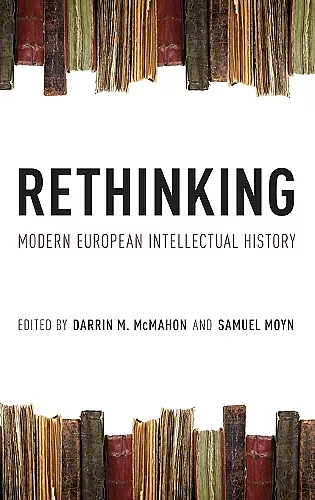Rethinking Modern European Intellectual History
Essays on the evolution and future of intellectual history
Samuel Moyn editor Darrin M McMahon editor
Format:Hardback
Publisher:Oxford University Press Inc
Published:27th Feb '14
Currently unavailable, and unfortunately no date known when it will be back
This hardback is available in another edition too:
- Paperback£49.49(9780199769247)

This collection of essays in Rethinking Modern European Intellectual History examines the evolution and future possibilities of the discipline, emphasizing theoretical reflection.
The book Rethinking Modern European Intellectual History presents a collection of essays authored by prominent scholars in the field of modern European intellectual history. Each essay delves into the theoretical and methodological foundations of the discipline, providing a comprehensive assessment of its evolution over time. The contributors reflect on the current challenges and opportunities faced by intellectual historians, highlighting the importance of self-awareness and critical reflection within the field.
In recent years, intellectual history has experienced a resurgence, marked by increased confidence and visibility among its practitioners. However, this rise comes with a paradox: while the field has gained prominence, there is a noticeable decline in rigorous self-reflection and theoretical justification for its practices. The essays in Rethinking Modern European Intellectual History explore this irony, as they seek to understand the factors that have contributed to the current state of the discipline and the implications for its future.
As the contributors navigate the complexities of intellectual history, they emphasize the necessity of engaging with broader disciplinary and interdisciplinary contexts. The book encourages intellectual historians to embrace the potential of eclecticism, recognizing it as both a risk and an opportunity. By fostering connections beyond traditional boundaries, the essays advocate for a renewed commitment to theoretical exploration and dialogue, ultimately aiming to enrich the practice of history in a globalized world.
This rich collection of articles explores the relatively recent past of the intellectual history of modern Europe in intriguing ways.... All of the authors are intellectually engaged with what intellectual history offers, intrigued by its future prospects, and aware of possible pitfalls of applying their proposals uncritically....This collection documents a field in an exciting state of evolution with many intriguing paths open to scholars and will be invaluable for anyone interested in understanding the current state of intellectual history. Many scholars will doubtless appreciate the clear paths through recent historiography of the various themes and sub-disciplines this collection treats. They will find a guide, a bibliography, and a thoughtful analysis of topics they might wish to pursue in their own work. * Kathleen Wellman, H-France *
Provocative.... This volume challenges readers to think broadly and critically about historical knowledge, but it also shows specifically how a new generation of intellectual historians is revitalizing an eclectic sub-discipline that never stays the same and never disappears. * Canadian Journal of History *
At the crossroads of many disciplines, intellectual history has emerged as a vital stimulus to the humanities as a whole. Shedding the residues of cultural condescension, European intellectual history in particular has come to be an endlessly renewable resource for creative thinking across the globe. As this lively volume amply demonstrates, it has a bright future in the hands of a new generation of gifted practitioners. * Martin Jay, University of California, Berkeley *
Over thirty years have passed since the last major attempt to reassess the field of modern European intellectual history. In light of the seeming eclipse of some orientations (such as Marxism), the reformulation of others (such as psychoanalysis), and the newer turns in the field (from the linguistic to the postsecular and the global), the time is certainly ripe for a new assessment. This volume will hold a key place in further efforts to 'rethink' the field both as a collection of significant contributions and as a focal point for constructive, critical debate. * Dominick LaCapra, Cornell University *
The study of modern intellectual history is gripped by the paradoxes of success. While scholarship in this area has flourished over the past generation, it has become so sprawling an enterprise that its very identity is in question. Perfectly timed to address the growing need for self-reflection in the field, Rethinking Modern European Intellectual History provides at once a map of the discipline, a meditation on its history, and a provocation to new thinking and writing on the history of European ideas. This collection is sure to become a landmark, not just for European intellectual historians, but for anyone with an interest in the history of ideas. * Joel Isaac, author of Working Knowledge: Making the Human Sciences from Parsons to Kuhn *
a superb collection ... The power of this book as a whole is to clarify the critical impact intellectual history can have on varied fields of inquiry and its centrality to historiography. The volume demonstrates elegantly that intellectual history remains an effective tool against disciplinary quiescence. * Carolyn J. Dean, American Historical Review *
ISBN: 9780199769230
Dimensions: 163mm x 239mm x 20mm
Weight: 675g
320 pages